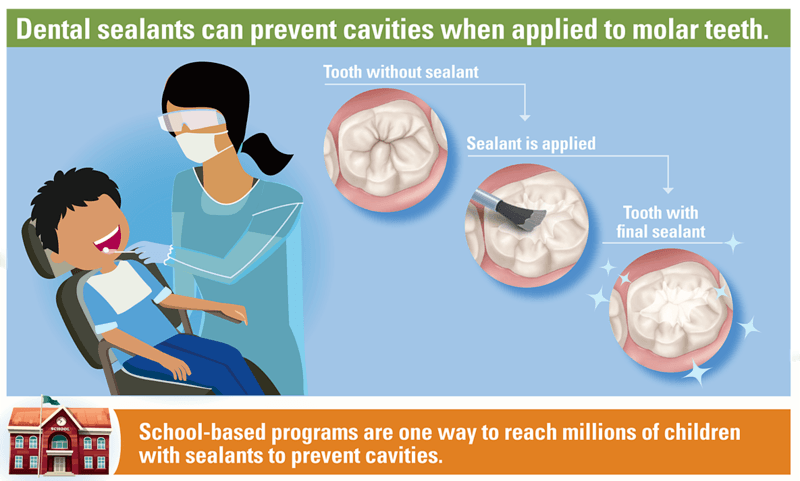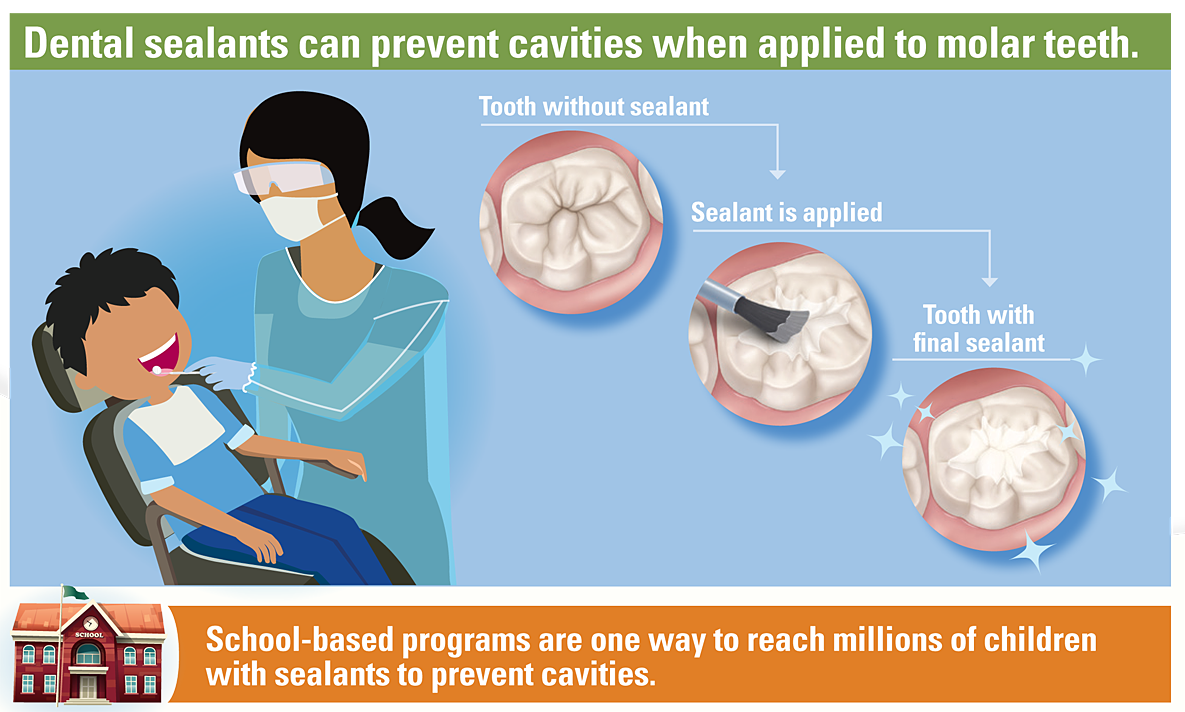
Do dental sealants work wonders in preventing cavities? Absolutely! Think of them as superhero capes for your teeth. Dental sealants are thin, protective coatings applied to the chewing surfaces of molars and premolars, where cavities often strike due to their grooved nature. These sealants act as a shield, blocking food particles and bacteria from hiding in tooth crevices, reducing the risk of cavities. It’s a simple, painless procedure providing long-lasting protection for all ages. So, the verdict is in – dental sealants are super effective in cavity prevention, a true dental hero for your smile.

Do Dental Sealants Prevent Cavities?
Dental Sealants: Cavity Prevention
How Do Dental Sealants Work?
- Plastic Protective Barrier: Dental sealants consist of a plastic material that is applied to the chewing surfaces of the teeth. Initially, it’s in liquid form and then hardens to create a protective shield.
- Preventing Plaque Accumulation: The sealant acts as a barrier, preventing plaque and bacteria accumulation. These microorganisms are primary contributors to tooth decay.
- Longevity: Dental sealants can last for several years, providing extended protection against cavities.
Targeted Areas
- Molars and Premolars: Dental sealants are most commonly applied to the molars and premolars, located at the back of the mouth. These teeth have deep grooves and pits that are challenging to clean with standard brushing and flossing.
- Groove and Pit Protection: The deep grooves and pits on these teeth are susceptible to food particle accumulation, making them prime locations for cavity development. Sealants effectively seal off these areas, adding an extra layer of defense against cavities.
Benefits of Dental Sealants
There are several benefits to getting dental sealants, including:
1. Prevention of Cavities: The primary benefit of dental sealants is their ability to prevent cavities. By creating a barrier between the teeth and harmful bacteria, sealants significantly reduce the risk of tooth decay.
2. Longevity: Sealants can last for many years with proper care. They are a cost-effective way to protect teeth from cavities for an extended period.
3. Easy Application: The process of applying sealants is quick and painless. It does not require any drilling or removal of tooth structure.
4. Protection for Children: Sealants are especially beneficial for children and teenagers who may have difficulty maintaining proper oral hygiene. They provide an extra layer of protection during these crucial years of tooth development.
Are Dental Sealants Effective?
Effectiveness of Dental Sealants
- Cavity Prevention: Numerous studies confirm the high effectiveness of dental sealants, particularly in preventing cavities, with a focus on children and teenagers.
- CDC Suggestion: The Centers for Disease Control and Prevention (CDC) recognizes dental sealants as a highly effective preventive measure in dentistry. They can reduce the risk of cavities in treated teeth by up to 80%.
Suitability for Different Age Groups
- Recommended for Children and Teenagers: Dental sealants are commonly recommended for children and teenagers, as they are more susceptible to cavities due to dietary habits and oral hygiene practices.
- Beneficial for Adults: While the primary focus is on younger individuals, adults who are prone to tooth decay or have deep grooves in their molars can also benefit from sealants. The decision to use sealants in adults is determined by a dentist based on individual oral health needs.
How Are Dental Sealants Applied?
The process of applying dental sealants is quick and painless. Here’s what you can expect during a sealant application:
1. Cleaning: The teeth that will receive sealants are thoroughly cleaned to remove any plaque or debris.
2. Isolation: The teeth are isolated and dried to ensure proper adhesion of the sealant material.
3. Etching: A mild acidic solution is applied to the chewing surfaces of the teeth to create a rough surface that helps the sealant bond securely.
4. Application: The sealant material is carefully applied to the grooves and pits of the teeth. It is then hardened using a special light.
5. Evaluation: Once the sealants are in place, your dentist will check their placement and make any necessary adjustments.
After the sealants are applied, you can resume your regular activities immediately. There is no downtime or recovery period associated with this treatment.
Do Dental Sealants Replace Good Oral Hygiene?
Dental Sealants and Oral Hygiene
- Dental sealants are effective in preventing tooth decay.
- They complement, but don’t replace, good oral hygiene practices.
- Proper oral hygiene includes brushing at least twice a day and daily flossing.
Comprehensive Protection
- Sealants act as a barrier against cavities, primarily in the molars.
- They work best when combined with regular dental check-ups and cleanings.
- Maintaining a consistent oral care routine is crucial for overall oral health.
Conclusion
Dental sealants are a valuable tool in preventing cavities, particularly in children and teenagers. By creating a protective barrier over the teeth, sealants can significantly reduce the risk of tooth decay. However, it is important to remember that sealants are not a replacement for good oral hygiene practices. Regular brushing, flossing, and dental visits are still crucial for maintaining optimal oral health. Talk to your dentist to see if dental sealants are a suitable option for you or your child.
Key Takeaways: Do Dental Sealants Prevent Cavities?
- Dental sealants are a protective coating applied to the chewing surfaces of teeth.
- They act as a barrier, preventing bacteria and food particles from causing cavities.
- Sealants are most effective when applied to permanent molars soon after they erupt.
- Regular brushing and flossing are still important even with sealants.
- Sealants are a safe and cost-effective way to reduce the risk of cavities.
Frequently Asked Questions
Question 1: What are dental sealants?
Dental sealants are thin, protective coatings applied to molars and premolars, forming a barrier against decay. The application process is quick, painless, and long-lasting. Teeth are cleaned, and the sealant is painted on, bonding to the enamel to shield against bacteria and acids for several years.
Question 2: How do dental sealants prevent cavities?
Dental sealants are essential for preventing cavities in the back teeth with deep grooves that are hard to clean. Sealants create a smooth surface, acting as a barrier that stops bacteria and food particles from causing decay in these challenging-to-reach areas, significantly improving oral hygiene and reducing the risk of cavities.
Question 3: Who can benefit from dental sealants?
Dental sealants are highly advantageous for children and teenagers, as they help guard against cavities during these formative years. Yet, adults with deep grooves in their molars or a history of dental decay can also benefit from sealants. Consulting a dentist for an evaluation can determine the suitability of sealants for individuals of all ages.
Question 4: How long do dental sealants last?
Dental sealants last 5 to 10 years but can vary due to oral hygiene, diet, and wear. Regular dental check-ups are essential to monitor their condition. Damaged sealants can be repaired or replaced by a dentist to maintain cavity prevention.
Question 5: Do dental sealants replace the need for brushing and flossing?
Dental sealants are not a replacement for regular brushing and flossing. Although they offer added protection against cavities, good oral hygiene practices, like daily brushing with fluoride toothpaste and flossing, remain vital for overall oral health. Utilizing sealants alongside these habits can effectively lower cavity risk and support a healthy smile.
How to PREVENT CAVITIES – Dental sealants ©
Final Summary: Do Dental Sealants Prevent Cavities?
Dental sealants unquestionably prevent cavities by creating a protective barrier against the bacteria and acids responsible for tooth decay. This simple and painless procedure is particularly beneficial for children and teenagers, who are more susceptible to cavities. Sealants offer long-lasting protection, with studies showing an up to 80% reduction in cavity risk during the first two years, followed by continued effectiveness for years. This minimizes the need for invasive dental treatments. The application process is quick, painless, and seamlessly blends with natural teeth. For those seeking to prevent cavities and maintain excellent oral health, dental sealants are a smart and proven investment.
Call or Book appointment online
:Ace Dental Care Alpharetta office: 678-562-1555 - Book Now
Ace Dental Care Norcross office: 770-806-1255 - Book Now
Disclaimer
This blog post was generated by artificial intelligence. The content of this post may not be accurate or complete, and should not be relied upon as a substitute for professional advice. If you have any questions about the content of this post, please contact us.
We are constantly working to improve the accuracy and quality of our AI-generated content. However, there may still be errors or inaccuracies. We apologize for any inconvenience this may cause.





